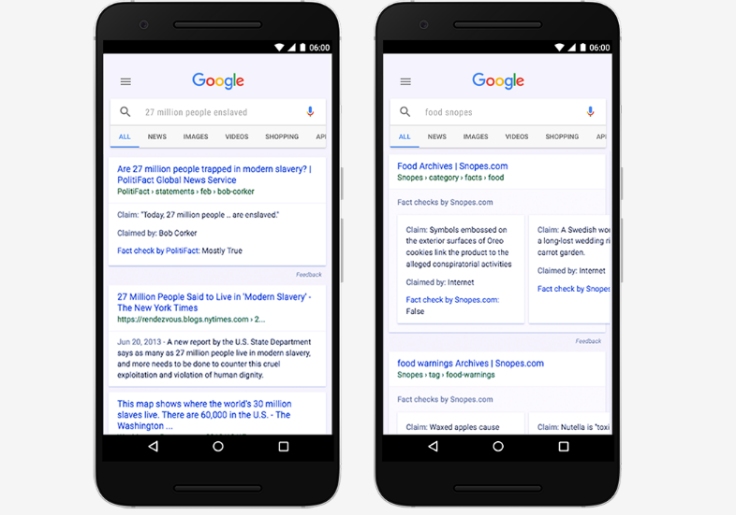Google Fact Check Helps Identify Fake News, Now Available In Search

In an effort to curb fake news, Google announced Friday it’s expanding its fact check feature in Google Search worldwide.
The fact check tag for Google News was introduced last October in the U.S. and U.K., a few weeks before the presidential election between President Donald Trump and Hillary Clinton.
The feature identifies articles that include information fact checked by news publishers and fact-checking organizations, such as PolitiFact and Snopes, not by Google itself. The company is now taking its fact check tag worldwide in all languages and expanding it to Search.
When users search on Google they’ll be able to see the tag with the search engine’s existing labels like opinion, local source and highly cited. Users will see a snippet with information on the claim, who made the claim and the fact of that specific claim.
However, don’t expect all new stories to be fact-checked, and there may be search result pages where different publishers checked the same claim but ended up with different conclusions.
“Even though differing conclusions may be presented, we think it’s still helpful for people to understand the degree of consensus around a particular claim and have clear information on which sources agree,” Google said in a blog post. “As we make fact checks more visible in Search results, we believe people will have an easier time reviewing and assessing these fact checks, and making their own informed opinions.”
Read: How To Spot Fake News, Facebook Explains; Launches AI ‘M’ To Messenger To Give Suggestions
Publishers who want to be included in the fach check feature will need to use the Schema.org ClaimReview markup on the specific pages where they fact check public statements, or they can use a widget developed by the Duke University Reporters Lab and Jigsaw.
Meanwhile, Facebook launched an educational tool in order to help users spot false news.
“False news and hoaxes are harmful to our community and make the world less informed,” the company said in a post. “All of us have a responsibility to curb the spread of false news.”
Google and Facebook’s steps to curb fake news come after Germany moved forward with a proposed legislation in which social media companies would face a fine of $53 million if they failed to quickly take down false news and hate speech content.
© Copyright IBTimes 2024. All rights reserved.











